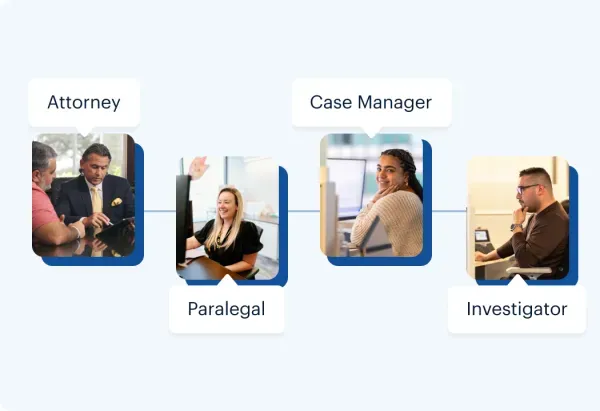Results may vary depending on your particular facts and legal circumstances. The attorney featured above is licensed in Florida. For a full list of attorneys in your state please visit our attorney page.
HOW TO REPORT A NURSING HOME IN PENNSYLVANIA
Nursing home abuse causes deep emotional and physical harm. We fight for justice and accountability.
Results may vary depending on your particular facts and legal circumstances. The attorney featured above is licensed in Florida. For a full list of attorneys in your state please visit our attorney page.
How to Report a Nursing Home in Pennsylvania
Nursing home abuse and neglect can produce mental and physical scars that last a lifetime on both a victim and a victim’s family members. If you believe a loved one has suffered from abuse and neglect while living at a nursing home, should know how to report a nursing home in PA.
Both federal and Pennsylvania statutes highlight the legal rights and protections enjoyed by residents of nursing homes. According to the Pennsylvania Adult Protective Services Act, every nursing home resident in the Keystone State has the right not to be the subject of abuse, neglect, and exploitation. Despite the strict legal standards applied to nursing home operators, far too many of them violate state and federal laws.
Since 1988, the nursing home abuse attorneys at Morgan & Morgan have helped clients fight back against the unlawful acts carried out by the operators of nursing homes. Not only do we provide strong legal support, but we also help the friends and family members of a nursing home resident learn how to identify the signs of abuse, neglect, and exploitation. We work with each client every step of the way to recover the financial losses caused by nursing home abuse.
Schedule a free case evaluation with one of our experienced personal injury lawyers to determine how to proceed with your case.
100,000+ Five Star Reviews
The reasons why clients trust Morgan & Morgan.
Results may vary depending on your particular facts and legal circumstances. Based on select nationwide reviews.
Our Results
How It Works
Unsure what to do next? With 35 years of experience, our personal
injury lawyers will guide you every step of the way.

Contact Us 24/7 - It’s Free
Start your claim

Meet your dedicated attorney
Meet the attorneys

We fight for more
Learn more about the case process
Results may vary depending on your particular facts and legal circumstances. The attorneys shown in these photos may not be licensed in your state. To find an attorney licensed in your area, please visit our attorney page.
Local Care
Backed by America’s Largest Injury Law Firm.
$30 Billion
Recovered for clients
nationwide700,000+
Clients and families
served1,000+
Attorneys across
the country1
Click may change your life
The attorney featured above is licensed in Florida. For a full list of attorneys in your state please visit our attorney page.
Results may vary depending on your particular facts and legal circumstances.
In the Community
Discover the local Morgan & Morgan experience with news, events, and partnerships.
Learn More
Injured and not sure what to do next?
We'll guide you through everything you need to know.
What Are the Types of Abuse in Nursing Homes?
When you think of nursing home abuse, you probably think about physical acts that harm a resident. However, nursing home abuse also encompasses acts that damage the mental and emotional state of a resident. Understanding the types of nursing home abuse is the first step for learning how to report a nursing home in PA.
Physical Abuse
Physical abuse at a nursing home consists of one or more employees committing abuse that physically endangers a resident. Acts such as pushing, kicking, and slapping represent examples of physical abuse. Another form of physical abuse is denying a resident sufficient food and water. If a resident does not receive prescribed medications, the resident can suffer physical harm.Sexual Abuse
As a form of physical abuse, sexual abuse often consists of acts of sexual battery. This includes unwanted advances and any physical contact made by an employee of a nursing home. In 2017, CNN ran a report that discovered a large number of mismanaged sexual abuse cases at more than 1,000 facilities.Emotional Abuse
Emotional abuse covers an act that compromises the psychological well-being of a resident. Constant yelling and taunting can take a considerable emotional toll that requires intensive therapy to treat. Although emotional abuse does not leave any visible scars, it does leave long-term emotional scars that include the development of acute fear and anxiety.Neglect
Many nursing home abuse cases center around neglect, which involves a nursing home employee leaving a resident unattended for lengthy periods. A lack of focused care can lead to the development of bedsores and infections, as well as malnutrition that eventually triggers other types of physical ailments.What Are the Nursing Abuse Warning Signs?
Understanding the signs of nursing home abuse, neglect, and exploitation is crucial for knowing when to report a nursing home in PA. Some signs such as a head wound or fractured bone are easy to detect. However, many signs require a concerted investigative effort on your part and possibly on the part of a law enforcement agency.
Visible Signs
The development of bedsores and pressure ulcers indicates a lack of proper care. Burns, welts, and bruises on the skin might be connected to physical abuse. Some signs of physical abuse might simply be accidental, such as a resident accidentally falling hard to the ground. Cuts and skin tears also might qualify as signs of nursing home abuse. Less obvious signs of physical abuse include dehydration and malnutrition.Non-Visible Signs
Signs of emotional abuse are much more difficult to detect. A loved one might develop insomnia or another type of sleep disorder stemming from the fear and anxiety generated by a nursing home employee committing acts of emotional abuse. If a loved one suddenly experiences mood swings, you should suspect that something is wrong and it needs to be addressed by a Pennsylvania government agency.What Are the Rights of Nursing Home Residents in PA?
Pennsylvania nursing homes must abide by regulations that protect the rights of residents. Failure to protect the rights of nursing home residents can lead to legal action taken by the family of a nursing home resident. The 1999-amended Health Care Facilities Act of 1979 ensures nursing home residents enjoy certain rights. The federal counterpart to the state law is called the Nursing Home Reform Act of 1987.
Nursing home residents cannot be recipients of verbal, physical, and emotional abuse. They must be free from restraints of any kind, as well as live in safe and clean conditions. Pennsylvania law requires nursing home operators to treat residents with respect, dignity, and consideration. Nursing home residents have the right to stay informed about their medical condition unless a physician believes that informing a resident is not in the best interest of the resident. Residents should never be subjected to medical experimentation or refused medical treatment that is considered legal under state and federal laws.
To learn more about the legal rights granted to nursing home residents in Pennsylvania, contact one of the nursing home abuse attorneys at Morgan & Morgan.
How Do I Report Nursing Home Abuse in Pennsylvania?
If a loved one has suffered from nursing home abuse, neglect, and/or exploitation, you can protect the rights of your loved one following a few steps. If you notice visible signs of abuse, you should contact law enforcement to conduct an investigation to determine whether you have enough evidence to warrant the filing of criminal charges. On the other hand, if you suspect abuse but do not believe your loved one is in imminent danger, you should report the abuse to the management team at the nursing home.
Unfortunately, far too many nursing homes fail to respond to reports of abuse. If the nursing home where your loved one lives refuses to cooperate, take the initiative by knowing how to report a nursing home in PA.
How Do I Report a Nursing Home in PA?
The Older Adults Protective Services Act (OAPSA) requires the reporting of elder abuse under any circumstance. You start by filing a complaint with the Pennsylvania Department of Aging by calling 800-490-8505. Pennsylvania law allows you to report nursing home abuse as an anonymous source. The state runs an Ombudsman Program for seniors and their loved ones to contact for support. To get in touch with your local ombudsman coordinator, call the Area Agency on Aging office.
You also can file a complaint by submitting the online complaint form or by sending an email to c-ncomplai@pa.gov.
Send a complaint by mail to the following address:
Division of Nursing Care Facilities Director
Pennsylvania Department of Health
Division of Nursing Care Facilities
625 Forster St., Room 526
Harrisburg, PA 17120Which Parties in Pennsylvania Are Required to Report Nursing Home Abuse?
Several states have passed universal reporting laws that cover elder abuse. This means everyone living in a universal reporting state has the legal responsibility to report elder abuse, neglect, and exploitation. Pennsylvania has not enacted a universal reporting law that covers cases of elder abuse. However, the state does require certain organizations to report suspected elder abuse.
- Nursing home facilities
- Home care agencies
- Adult daycare centers
- Residential treatment facilities
- Domiciliary care homes
- Personal care homes
What Do I Need to Know About Reporting Nursing Home Abuse?
Although you want to report nursing home abuse, the nagging feeling of your loved one suffering from retaliatory actions might make you hesitant to file a complaint. The solution to your dilemma involves filing a complaint anonymously with the nursing home or filing a complaint by using your name with the Pennsylvania Department of Health. Under state law, a government agency cannot reveal the source of a complaint filed for nursing home abuse, neglect, and/or exploitation.
You do not have to witness abuse. All you need is a reasonable suspicion that there is enough evidence to indicate abuse. The OAPSA protects you from any type of civil or criminal liability for reporting nursing home abuse.
How Can a Nursing Home Abuse Attorney Help?
When you schedule a free case evaluation with one of our highly-rated lawyers, one of the first items on the agenda is for the attorney to educate you about how to report a nursing home in PA. When you work with a nursing home lawyer from Morgan & Morgan, you can delegate the responsibility for reporting nursing home abuse to the legal counsel. Having an attorney file a complaint for nursing home abuse, neglect, and exploitation should motivate the nursing home in question to conduct a thorough investigation. Revealing one act of nursing home abuse often opens the legal door to other cases at the same facility.
Your legal counsel conducts an investigation that involves the gathering and organizing of evidence. If your nursing home abuse lawyer cannot convince the nursing home to settle, then the next way a lawyer can help you involves coaching you during the litigation process. Filing a civil lawsuit that seeks monetary damage might motivate the nursing home to negotiate a favorable settlement. Your attorney prepares you for trial by asking you the same questions the nursing home’s legal counsel will ask you.
The goal of your nursing home abuse lawyer is to get your loved one compensated for suffering from abuse. Compensation comes in three forms: economic damages, non-economic damages, and punitive damages. Because of the super-charged emotions that regard a nursing home abuse case, most judges and juries lean hard on violators by approving substantial awards for punitive damages. Non-economic damages refer to issues such as pain and suffering, which cover the different types of emotional abuse. Economic damages pay for tangible costs, such as medical bills and any damage done to personal property.
Do not allow a nursing home to bully a loved one. Schedule a free case evaluation today to learn how to report a nursing home in PA.

























